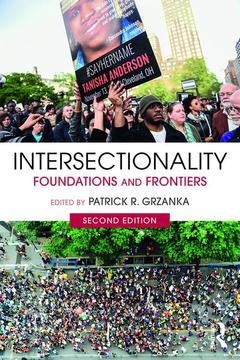Intersectionality (2nd Ed.) Foundations and Frontiers
Coordonnateurs : Grzanka Patrick, Grzanka Patrick R.

Intersectionality: Foundations and Frontiers is an accessible, primary source-driven exploration of intersectionality in sociology, psychology, women?s and gender studies, and related fields. The book maps the origins of the concept, particularly in Black feminist thought, opens the discourse to challenges and applications across disciplines and outside academia, and explores the leading edges of scholarship to reveal important new directions for inquiry and activism. Charting the development of intersectionality as an intellectual and political movement, Patrick R. Grzanka brings together in one text both foundational readings and emerging classics. The completely revised and expanded second edition includes 17 new readings, including an original essay by Lisa Bowleg on the urgency of intersectionality in contemporary politics.
Acknowledgements; Preface; Introduction "Intersectional Objectivity: On Knowledge and Violence" (Patrick R. Grzanka);I. Law Introduction: Systems of Oppression (Patrick R. Grzanka); 1. "Life is Complicated, and Other Observations" (Patricia Williams); 2. "Immigrant Acts" (Lisa Lowe); 3. "The Structural and Political Dimensions of Intersectional Oppression" (Kimberlé Williams Crenshaw); 4. "White Women’s Ambivalence Toward Affirmative Action" (Sumi Cho); II. Epistemology; Introduction: Knowledge/Power/Standpoint (Patrick R. Grzanka); 5. "Racism and Women’s Studies" (Barbara Smith); 6. "Situated Knowledges and the Persistence of Vision" (Donna Haraway); 7. "The Trouble with Postmodernism" (Patricia Hill Collins); 8. "Felt Intuition" (Phillip Brian Harper); 9. "Epistemic Violence" (Kristie Dotson); III. Identities; Introduction: The (Intersectional) Self and Society (Patrick R. Grzanka); 10. "Black Women and Welfare" (Angela Y. Davis); 11. "The ‘Home’ Question" (Chandra Talpade Mohanty); 12. "Identity as a Weapon of Mass Destruction" (Shuddhabrata Sengupta); 13. "‘It’s Not Psychology’: Gender, Intersectionality and Activist Science" (Stephanie Shields); IV. Methods; Introduction: What Do We Do Now? (Patrick R. Grzanka); 14. "Reproductive Justice" (Loretta J. Ross); 15. "When Black + Woman + Lesbian ≠ Black Lesbian Woman" (Lisa Bowleg); 16. "Intersectional Psychology: (At Least) Three Questions" (Elizabeth R. Cole); 17. "From Intersections to Assemblages" (Jasbir K. Puar); V. Space, Place, Communities, Geographies; Introduction: The Cartographic Imagination (Patrick R. Grzanka); 18. "Feminist Architecture" (Gloria Anzaldúa); 19. "Beyond the Flames: Sexuality, Race, and the 1968 D.C. Riots" (Kwame Holmes); 20. "The Capital of Diversity: Gentrification and Multiculturalism in Washington, D.C." (Justin T. Maher); 21. "Sex and Tourism" (Nan Alamilla Boyd); VI. Culture and the Politics of Representation; Introduction: Media as Sites/Sights of Justice (Patrick R. Grzanka); 22. "‘Why Are You Laughing?’" (bell hooks); 23. "Ambivalent Drag" (Judith Butler); 24. "Consider Phillip Devine" (C. Riley Snorton); 25. "The Sixpack as ‘High Art’" (Rosalind Gill); VII. Violence and Resistance; Introduction: On Pragmatism (Patrick R. Grzanka); 26. "Anger as a Response to Racism" (Audre Lorde); 27. "Brothermothering" (Sinikka Elliott, Joslyn Brenton, and Rachel Powell); 28. "Academia and Activism" (Patricia Ticineto Clough and Michelle Fine); 29. "#SayHerName: Digital Intersectional Activism" (Melissa Brown, Rashawn Ray, Ed Summers, and Neil Fraistat); VIII. Nations, Borders, and Migrations; Introduction: Transnational Interventions (Patrick R. Grzanka); 30. "Transnational Feminism and Intersectionality: A Dialogue" (Sylvanna M. Falcón and Jennifer C. Nash); 31. "‘A Few Bad Apples’: The Antisodomy Law and the Police State in India" (Jyoti Puri); 32. "Imagine Otherwise" (Kandice Chuh); 33. "Undocuqueer: Beyond the Shadows and the Closet" (Jesus Cisneros); IX. Politics, Rights and Justice; Introduction: Political Diffractions (Patrick R. Grzanka); 34. "The New Homonormativity" (Lisa Duggan); 35. "Sameness and Difference in Women of Color Organizing" (Zakiya Luna); 36. "A Mother’s Plea for Help" (Ruth Wilson Gilmore); 37. "Do Interest Groups Represent the Disadvantaged?" (Dara Z. Strolovitch); X. Science, Technology, Medicine, and Bodies; Introduction: Science and Technology Studies as Tools for Social Justice (Patrick R. Grzanka); 38. "Science, Race and Sexuality" (Siobhan B. Somerville); 39. "A Tale of Two Technologies" (Laura Carpenter and Monica Casper);40. "My So-Called Choice: Embodied Knowledge, Feminist Politics, and the Political Economy of Contraceptive Technologies" (Chikako Takeshita); 41. "Feminist, Queer, Crip" (Alison Kafer); Epilogue (Lisa Bowleg)
Patrick R. Grzanka is an assistant professor of psychology at the University of Tennessee, Knoxville. His interdisciplinary research has been supported by funding from the National Science Foundation and the Society for the Psychological Study of Social Issues, and his work has appeared in a wide range of journals, including the Journal of Counseling Psychology, Sexuality Research and Social Policy, Symbolic Interaction, American Journal of Bioethics, and WSQ: Women’s Studies Quarterly.
Date de parution : 01-2019
15.2x22.9 cm



